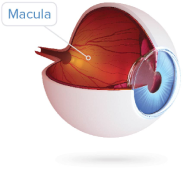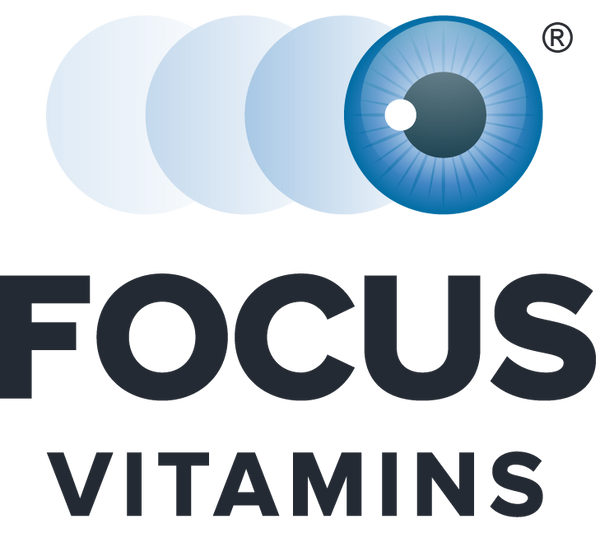Eye Conditions
Age-Related Macular Degeneration (AMD or ARMD)
AMD is a disease of the macula—a small area of nerve tissue at the back of the eye allowing for things like reading and driving.
Age-related macular degeneration (AMD) is an eye disease that causes the breakdown of a small area at the center of the retina called the macula. As the leading cause of vision loss in those over the age of 60, it's important for you to understand what it is and what you can do to protect your vision.

The macula is responsible for your central vision, which allows you to see fine details clearly to enjoy everyday activities like reading, driving, and recognizing the faces of your loved ones. Progressively damaging the macula, AMD can result in the blurring, darkening, or distortion of your central vision. In some cases it can lead to permanent vision loss. There are two types of AMD, dry and wet, each affecting the eye differently and with varying symptoms.
Dry AMD
Most people who have macular degeneration have the dry type. Approximately 10 percent of people who have macular degeneration have the wet type.
Most cases of AMD originate with the dry form—caused by the aging and thinning of macular tissue. This condition
usually develops slowly and may result in mild vision distortion. Although, in some severe cases, vision loss
can be more significant.
Dry AMD is characterized by tiny yellow deposits that form under the retina called drusen. Drusen can be
detected using advanced imaging technology by your eye physician.
Risk Factors
Age
The most significant risk factor for macular degeneration is age. Beyond the age of 50, the chances of getting macular degeneration go up. People over 75 years of age are approximately six times as likely to develop macular degeneration as people aged 45-50.
Genetics
About 20% of macular degeneration is due to family history; the remaining 80% is the result of other factors. Research has shown that first-degree relatives of patients with macular degeneration are three times more likely to develop the condition. Other research shows that the risk of developing macular degenerations is about 19 times higher than normal for a sibling of someone with macular degeneration.
Smoking
Tobacco smoking is clearly associated with macular degeneration. Smoking doubles your risk of developing macular degeneration. Additionally, current or ex-smokers should not take the vitamin supplements like Focus MaculaPro® that have beta-carotene because beta-carotene may increase the risk of lung cancer in smokers.
Gender
Women are more likely to develop age-related macular degeneration than men. Additionally, women tend to live longer than men and therefore are more likely to suffer severe vision loss from macular degeneration.
Race
Macular degeneration is more prevalent among Caucasians and Asians than African-Americans and Hispanics.
Dietary Factors
Eating a poor diet increase the risk of getting macular degeneration. A healthy diet may decrease that risk.
Sunlight
Increased exposure to bright sunlight may increase your chances of developing macular degeneration later in life.
Eye Color
People with light-colored eyes are at higher risk for developing macular degeneration than those with dark eyes.
High Blood Pressure
People with high blood pressure have a higher risk of developing macular degeneration.
Farsightedness
There is a relationship between being extremely farsighted and having both dry and wet age-related macular degeneration.
Obesity
There is a link between obesity and the progression of early and intermediate stage macular degeneration to advanced macular degeneration.
Signs & Symptoms
• Blurry distance and/or near vision
• Need for bright light to see up close
• Colors appear more dull and muted
• Hazy vision
• Difficulty seeing when going from bright light to low light
• Difficulty recognizing people's faces
• Dark or blurry spot in your central vision
• Wavy vision — straight lines appear bent or irregular
• Dark spots or blank spots in your vision
• Loss of central vision
• Size of objects may be different for each eye
 Example: Distorted vision caused by macular degeneration.
Example: Distorted vision caused by macular degeneration.
Diagnosis
Many people do not know they have macular degeneration until they notice they have blurred or distorted vision.
Regular eye exams by an ophthalmologist or optometrist can help to detect the early stages of macular
degeneration before you are aware of them.
To check for macular degeneration, your eye doctor will dilate your pupils so he/she can see your retina and
macula. If macular degeneration is noted, your doctor may have you use an Amsler grid to check for macular
degeneration symptoms like wavy, blurry or dark areas in your vision.
Your doctor may take special photographs of your eye with tests such as optical coherence tomography (OCT) and
fluorescein angiography (FA). OCT is a high-tech instrument that can detect fluid from wet macular degeneration
by creating a special picture of your macula.
In fluorescein angiography, fluorescein dye is injected into a vein in your arm. The dye travels throughout the
blood vessels of the body, including your retinas. Abnormal areas in the retina will be highlighted by the dye,
showing your doctor whether wet macular degeneration is present and guiding treatment.
Supplements
Dry Macular Degeneration Treatment
Right now there is no cure for the dry form of macular degeneration. However, a large scientific study performed by the National Eye Institute has shown that the antioxidant vitamins and zinc contained in Focus MaculaPro® supported eye health.
Wet Macular Degeneration Treatment
There are three medications used to treat wet macular degeneration: Avastin (bevacizumab), Lucentis
(ranibizumab) and EYLEA (Afibercept). Each of these drugs target a chemical in the eye known as vascular
endothelial growth factor, or VEGF. Blocking VEGF reduces the growth of abnormal blood vessels associated with
wet macular degeneration, slows their fluid leakage, helps to slow vision loss, and in some patients improves
vision.
Your retina specialist injects these medications directly in to your eye in an outpatient procedure. Before the
procedure, your retina specialist will clean your eye with Betadine to prevent infection and will use an
anesthetic to numb your eye. You may need several injections over the course of many months to stop the disease.
Long-term anti-VEGF treatment is often needed for sustained benefit.
Nutritional Supplements for Macular Degeneration
In 1992, the National Eye Institute launched the Age-Related Eye Disease Study (AREDS)* to determine whether
high doses of antioxidant vitamins and minerals could support vision health. Published in 2001, the results
clearly demonstrated that the tested ingredients provided ocular health benefits. Based on the findings of this
landmark study, we developed our first product for macular health—Focus MaculaPro®.
A follow-up study (AREDS2®) was conducted between 2006-2012, testing modifications to improve the original
formula. The results found that betacarotene, an ingredient which may increase the risk of developing lung
cancer among smokers, could be replaced with lutein and zeaxanthin. Focus Select™ is based on the AREDS2 study,
providing a premium supplement which promotes macular health and is safe for smokers and non-smokers.
